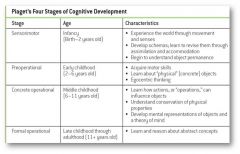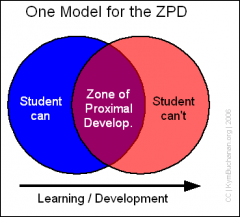![]()
![]()
![]()
Use LEFT and RIGHT arrow keys to navigate between flashcards;
Use UP and DOWN arrow keys to flip the card;
H to show hint;
A reads text to speech;
22 Cards in this Set
- Front
- Back
|
Developmental Psychology |
the study of continuity and change across the life span |
|
|
Infancy |
the stage of development that begins at birth and lasts between 18 and 24 months |
|
|
Childhood |
the stage of development that begins at about 18-24 months and lasts until adolescence |
|
|
Habituation |
a general process in which repeated or prolonged exposure to a stimulus results in gradual reduction in response |
|
|
Motor Development |
the emergence of the ability to execute physical action |
|
|
Reflexes |
specific patterns of motor response that are triggered by specific patterns of sensory stimulation |
|
|
Cognitive Psychology |
scientific study of mental processes including perception, thought, memory, and reasoning |
|
|
Cognitive Development |
the emergence of the ability to understand the world. |
|
|
Piaget's Stages |

|
|
|
Schemas |
theories about how the world works |
|
|
Assimilation |
infants apply their schemas in novel situations |
|
|
Accommodations |
revise their schemas to fit new info |
|
|
Object Permanence |
the idea that objects continue to exist even when they are not visible |
|
|
Conservation |
quantitative properties of an object are stable despite changes in the objects appearance (mass, volume) "operations" |
|
|
Egocentrism |
the failure to understand that the world appears differently to different observers |
|
|
Theory of mind |
the idea that human behavior is guided by mental representation |
|
|
Joint Attention |
the ability to focus on what another person is focused on |
|
|
Social Referencig |
the ability to use another persons reaction as info |
|
|
Imitation |
the ability to do what another person does (or meant to do) |
|
|
Zone of Proximal Development |

ability boosted by adult support |
|
|
Attchment |
the emotional bond that forms between newborns and their primary caregiver |
|
|
Internal Working model of attachment |
a set od expectations about how the primary caregiver will respond when the child feels insecure |

